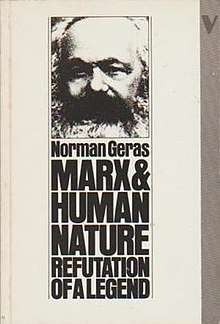Marx and Human Nature
 Cover of the first edition | |
| Author | Norman Geras |
|---|---|
| Country | United Kingdom |
| Language | English |
| Subject | Marx's theory of human nature |
| Publisher | Verso Books |
Publication date | 1983 |
| Media type | Print (Paperback) |
| Pages | 126 |
| ISBN | 978-1784782351 |
Marx and Human Nature: Refutation of a Legend is a 1983 book by the political theorist Norman Geras, in which the author discusses Marx's theory of human nature with reference to Marx's Sixth Thesis on Feuerbach. Geras argues that Marx did not deny the existence of a universal human nature, and maintains that the concept of human nature is compatible with historical materialism.
The book is considered a classic, and Geras's conclusions have been endorsed by scholars.
Summary
Geras discusses Karl Marx's Sixth Thesis on Feuerbach, which states of the philosopher Ludwig Feuerbach: "Feuerbach resolves the essence of religion into the essence of man. But the essence of man is no abstraction inherent in each single individual. In its reality it is the ensemble of the social relations. Feuerbach, who does not enter upon a criticism of this real essence, is hence obliged: 1. To abstract from the historical process and to define the religious sentiment by itself, and to presuppose an abstract - isolated - human individual. 2. Essence, therefore, can be regarded only as 'species', as an inner, mute, general character which unites the many individuals in a natural way."[1]
Geras maintains that the concept of human nature is compatible with historical materialism, and criticized Louis Althusser and his followers for popularizing a belief to the contrary.[2] Geras is also critical of the Hungarian Marxist philosopher István Mészáros, finding his work Marx's Theory of Alienation (1970) to be an example of the way in which Marxists have illogically denied that human nature exists even while engaging in analysis of Marx that depends on the concept of a human nature.[3]
Philosophers Geras takes a more favorable view of include the Croatian Gajo Petrović, author of Marx in the Mid-Twentieth Century (1965), and the Canadian Gerald Cohen, author of Karl Marx's Theory of History: A Defence (1978). Geras calls Cohen's book the leading philosophical discussion of the way in which the character of human beings in any setting depends upon the nature of the prevailing social relations.[4]
Publication history
Marx and Human Nature was first published by Verso Books in 1983.[5]
Reception
Mainstream media
Marx and Human Nature received a positive review from the political philosopher Steven Lukes in The Times Literary Supplement. Lukes found Geras's case that Marx did accept the concept of human nature convincing.[6]
Academic journals
Marx and Human Nature was reviewed by the political scientist David McLellan in Political Studies and discussed by Joseph Fracchia in Historical Materialism.[7][8]
McLellan found Geras's interpretation of Marx's Sixth Thesis on Feuerbach was convincing, and wrote that his book showed "exemplary analytical rigour" and was a "most welcome and timely addition to the study of Marx."[7] Fracchia argued that, like other authors who have attempted to offer a historical-materialist account of human nature, Geras was unsuccessful because he was "not materialistic enough" and failed to base his depiction of human nature in "human corporeal organisation".[8]
Evaluations in books
The psychoanalyst Joel Kovel, writing in History and Spirit (1991), credited Geras with providing a thorough discussion of the Sixth Thesis on Feuerbach and endorsed Geras's view that Marx had a definite conception of human nature, and unlike adherents of social constructionism did not believe that human being can be reduced to its relation with others.[9] The political theorist Terrell Carver, writing in an appendix to the 1995 version of the historian of ideas Isaiah Berlin's Karl Marx: His Life and Environment, described Geras's book as a classic study of the question of whether Marx believed in human nature.[10] The critic Terry Eagleton, writing in Why Marx Was Right (2012), called Geras's book "excellent".[11]
References
Footnotes
- ↑ Geras 1983, p. 29.
- ↑ Geras 1983, p. 19.
- ↑ Geras 1983, pp. 53–54.
- ↑ Geras 1983, pp. 19, 39–40, 117.
- ↑ Geras 1983, p. 4.
- ↑ Lukes 1984, p. 366.
- 1 2 McLellan 1984, p. 159.
- 1 2 Fracchia 2005, p. 34.
- ↑ Kovel 1991, p. 255.
- ↑ Carver, Berlin & Ryan 1995, p. 214.
- ↑ Eagleton 2012, p. 80.
Bibliography
- Books
- Carver, Terrell; Berlin, Isaiah; Ryan, Alan (1995). Karl Marx: His Life and Environment. London: Fontana Press. ISBN 0-00-686339-6.
- Eagleton, Terry (2012). Why Marx Was Right. New Haven: Yale University Press. ISBN 978-0-300-18153-1.
- Geras, Norman (1983). Marx and Human Nature: Refutation of a Legend. London: Verso Editions. ISBN 0 86091 767 3.
- Kovel, Joel (1991). History and Spirit: An Inquiry into the Philosophy of Liberation. Boston: Beacon Press. ISBN 0-8070-2916-5.
- McLellan, David (1995). The Thought of Karl Marx: An Introduction. London: Papermac. ISBN 0-333-63948-0.
- Journals
- Fracchia, Joseph (2005). "Beyond the Human-Nature Debate: Human Corporeal Organisation as the 'First Fact' of Historical Materialism". Historical Materialism. 13 (1). – via EBSCO's Academic Search Complete (subscription required)
- Lukes, Steven (1984). "Old Man redeemed". The Times Literary Supplement (4227).
- McLellan, David (1984). "Marx and Human Nature (Book)". Political Studies. 32 (1). – via EBSCO's Academic Search Complete (subscription required)